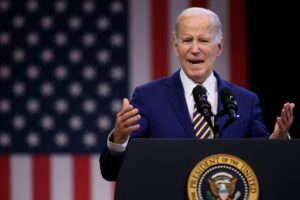The globalists had another group therapy session. This time, they traveled to Dubai as part of the World Government Summit, with the likes of Klaus Schwab doing his best impression of a classic James Bond villain. Under the theme of “Shaping Future Governments,” leaders, global experts, and decision-makers championed the typical and odious tenets of globalism, from never letting a crisis go to waste to mastering the future. Suffice it to say, everyone – except Elon Musk – made Klaus Schwab proud.
A Klaus Schwab Government
Like the World Economic Forum, the World Government Summit was another event espousing the gobbledygook of New World Order. The three-day event featured three noteworthy speeches, two of which resulted in the globalists saying the quiet part out loud.
Ian Bremmer, the president and founder of Eurasia Group, proclaimed that campaigns like America First are “obstacles” to a “new order.” But these are hurdles that can easily be overcome because the wide array of crises that occur throughout the world are “seeds” to instituting a one-world government, according to Bremmer. “Do you see that misalignment playing out in all of them are challenging globalization?” Bremmer said. “They’re all creating some of the crises that we see in our headlines around the world and in this region today. Those crises create the seeds of a new order.”
The globalist superstar Klaus Schwab informed the audience that the world is moving “into the exponential phase.” He purported that the wide range of technologies – artificial intelligence, the metaverse, and synthetic biology – will change our daily lives in a decade. But here is the funniest part of his speech: “Who masters those technologies, in some way, will be the masters of the world.”
Fortunately, Tesla Motors and Twitter CEO Elon Musk poured cold water on these individuals, warning that the concept of a world government and the idea of expanded cooperation between states are risks to the survival of civilizations.
“So, I think we want to be a little bit cautious about being too much of a world of a single civilization because if we are too much of a single civilization, then the whole thing may collapse,” Musk stated. “It sounds a little odd, but we want to have some amount of civilizational diversity such that if something does go wrong with some part of civilization, the whole thing doesn’t collapse, and humanity keeps moving forward.”
In response to Musk’s comments, Ian Miles Cheong, an independent journalist, may have said it best on Twitter: “Elon Musk is the anti-Klaus Schwab.”
In Debt We Trust
The Federal Reserve Bank of New York (FRBNY) published its quarterly Household Debt and Credit Report for the fourth quarter. The results? Terrifying. During the October-December period, total household debt climbed by 2.4%, or $394 billion. This was the largest nominal three-month boost in two decades, totaling $16.9 trillion, and it is showing zero signs of slowing down amid rampant inflation.
Here is a quarterly breakdown of the debt and credit developments in the last quarter:
- Mortgage: +$254 billion to $11.92 trillion
- Home Equity Line of Credit: +$14 billion to $340 billion
- Student Debt: +$21 billion to $1.6 trillion
- Auto Debt: +$28 billion to $1.55 trillion
- Credit Card Debt: +$61 billion to $990 billion
- Other: +$16 billion to $510 billion
Even worse, flows into serious delinquency – 90 days or more delinquent – are increasing for most of these categories, led by credit card debt (4.01%), auto loan debt (2.22%), and “other” (3.96%). Student loan delinquency was the only category to show a decline, falling from 1.1% to 1.02% from Q4 2021 to Q4 2022. US taxpayers, who were forced to fund the Fresh Start program, can be thanked for this trend.
So, the next time the business news networks claim the consumer is strong based on robust consumption levels, it might be worth referencing the FRBNY financial data to debunk this notion.
Dude, Where’s My Disinflation?

Joe Biden (Photo by Chip Somodevilla/Getty Images)
It was not a great week for President Joe Biden and Fed Chair Jerome Powell, at least on the inflation front. The annual consumer price index (CPI) eased to a higher-than-expected 6.4% and the month-over-month rose at a whopping 0.5% in January. The producer price index (PPI) slowed to 6%, but wholesale prices advanced at a larger-than-expected pace of 0.7% on a monthly basis. In addition, the Fed Bank of Philadelphia’s Prices Paid subindex increased to 26.5, while US export prices unexpectedly rose 0.8%.
Indeed, the latest figures put a damper on the disinflation narrative, igniting some consternation among investors that the US central bank might raise interest rates higher than 25 basis points in March. Moreover, two Fed officials – St. Louis Fed Bank President James Bullard and Cleveland Fed Bank President Loretta Mester – revealed that they advocated for a half-point rate hike at the February Federal Open Market Committee (FOMC) policy meeting, suggesting that the Eccles Building may need to pull the trigger on a 50-basis-point bump.
While Bullard agreed with his boss that the “disinflationary” process has begun, a hawkish 0.5% boost to the benchmark federal funds rate would “lock in” the disinflation. “The US economy is growing faster than previously thought, and labor market performance remains robust with unemployment below its longer-run natural level,” Bullard said. “Continued policy rate increases can help lock in a disinflationary trend during 2023, even with ongoing growth and strong labor markets, by keeping inflation expectations low.”
According to the CME FedWatch Tool, the market is still penciling in a quarter-point jolt at the March 21-22 powwow.
Please respect our republishing guidelines. Republication permission does not equal site endorsement. Click here.

